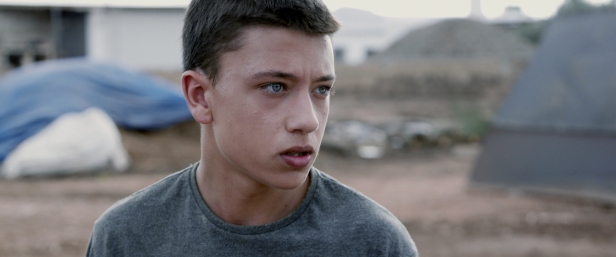
 La Madre was a challenging start to my ¡Viva! viewing, both in terms of its uncompromising aesthetic and barebones story. The title is slightly misleading in that the protagonist is 14 year-old Miguel. His mother is largely absent and when she is present she doesn’t contribute a great deal. This explains why Miguel has attracted the attention of social services in his small town in the Valencia region. They want to take him into care and he is hoping that his mother will get a job and be able to provide a home for him.
La Madre was a challenging start to my ¡Viva! viewing, both in terms of its uncompromising aesthetic and barebones story. The title is slightly misleading in that the protagonist is 14 year-old Miguel. His mother is largely absent and when she is present she doesn’t contribute a great deal. This explains why Miguel has attracted the attention of social services in his small town in the Valencia region. They want to take him into care and he is hoping that his mother will get a job and be able to provide a home for him.
We first meet Miguel on the street, attempting to sell packets of tissues to motorists at traffic junctions. The camera follows him closely, often focusing on the back of his neck. He’s learned how to be resilient in pursuing the necessities of daily life – shoplifting, accepting food from his friends at school who don’t always eat their packed lunches, selling his (stolen) tissues. We don’t know why his mother is in the state she is in – lacking energy, sleeping during the day and seemingly suffering from depression. We don’t learn about Miguel’s absent father. Quite early on I was reminded of Moonlight, not only because of the mother-son set-up, but also because of the roaming hand-held camera and the use of shallow focus.
As in Moonlight, the narrative provides the young teenager with a surrogate father figure. In this case, at his mother’s prompting, Miguel seeks out her ex-lover Bogdan, who lives in a neighbouring district with his son Andrei. Andrei is a few years older than Miguel and not necessarily pleased to see the younger boy. But it is during his time with Bogdan that Miguel will meet María (the impressive Nieve de Medina) a woman who runs a local bar-café and who offers Miguel the kind of adult support he hasn’t very often experienced. How will he respond and how will it affect his feelings about his mother?
There is nothing sentimental about La Madre and little in the way of generic trappings or obvious narrative delights. The setting is important. This is the south of Spain in a landscape of dusty roads, humdrum residential areas and industrial estates. There is no escape for Miguel into places of natural beauty or contact with animals. It’s traffic junctions, bus stops, small shops etc. It’s also a ‘sterile’, almost abstract environment with relatively few people on the streets or in the shops and bars. Presented in CinemaScope framings, the images seem to contradict or challenge our assumptions about what kind of film this might be.

After the screening I read about the film on Cineuropa’s website which carries a review and an interview with the director and co-writer Alberto Morais. He tells us that he wanted to make a film about the new economic ‘war’ on the poor and that his starting point was observing children in Russia after the fall of communism. The orphanages and children’s homes closed and children were sleeping in the metro stations. He argues that he is making a ‘film of the moment’, but not offering a moral point of view. He had the idea of focusing on attitudes towards the marginalisation of migrants by having a Spanish boy be taken in by Romanian migrants. He also gives us ideas about his own influences – Bergman and Pasolini are mentioned but he seems to make a judgement against the Dardenne Brothers and generally what he sees as the ‘Catholic guilt’ of many liberal ‘social’ films. I’m still trying to understand this approach. I like the Dardennes and I’m wary of Bergman (I don’t know Pasolini well enough to make a judgement). I think perhaps I like my realism combined with melodrama and enough sociology to place the characters and the story in the world I recognise. Morais and his co-writers have a different strategy. I think I would have found the narrative even more difficult to engage with if it hadn’t been for the extraordinary performance by the young debutant actor Javier Mendo as Miguel. My attention was certainly held by Miguel/Mendo who is on screen almost all the time. He has one of those faces that can switch from vulnerability to resilience and an almost adult sense of introspection. I couldn’t say that I ‘enjoyed’ La Madre, but I was impressed by the filmmaking and the performances. I don’t think a little more emotion would have undermined the film’s purpose.
The trailer below shows some of the visual style and conveys the tension of Miguel’s experiences.
